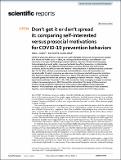| dc.contributor.author | Jordan, Jillian J | |
| dc.contributor.author | Yoeli, Erez | |
| dc.contributor.author | Rand, David G | |
| dc.date.accessioned | 2022-08-04T17:53:52Z | |
| dc.date.available | 2022-08-04T17:53:52Z | |
| dc.date.issued | 2021 | |
| dc.identifier.uri | https://hdl.handle.net/1721.1/144234 | |
| dc.description.abstract | <jats:title>Abstract</jats:title><jats:p>COVID-19 prevention behaviors may be seen as self-interested or prosocial. Using American samples from MTurk and Prolific (total <jats:italic>n</jats:italic> = 6850), we investigated which framing is more effective—and motivation is stronger—for fostering prevention behavior intentions. We evaluated messaging that emphasized <jats:italic>personal</jats:italic>, <jats:italic>public</jats:italic>, or <jats:italic>personal and public</jats:italic> benefits of prevention. In initial studies (conducted March 14–16, 2020), the Public treatment was more effective than the Personal treatment, and no less effective than the Personal + Public treatment. In additional studies (conducted April 17–30, 2020), all three treatments were similarly effective. Across all these studies, the perceived <jats:italic>public</jats:italic> threat of coronavirus was also more strongly associated with prevention intentions than the perceived <jats:italic>personal</jats:italic> threat. Furthermore, people who behaved prosocially in incentivized economic games years before the pandemic had greater prevention intentions. Finally, in a field experiment (conducted December 21–23, 2020), we used our three messaging strategies to motivate contact-tracing app signups (<jats:italic>n</jats:italic> = 152,556 newsletter subscribers). The design of this experiment prevents strong causal inference; however, the results provide suggestive evidence that the Personal + Public treatment may have been more effective than the Personal or Public treatment. Together, our results highlight the importance of prosocial motives for COVID-19 prevention.</jats:p> | en_US |
| dc.language.iso | en | |
| dc.publisher | Springer Science and Business Media LLC | en_US |
| dc.relation.isversionof | 10.1038/S41598-021-97617-5 | en_US |
| dc.rights | Creative Commons Attribution 4.0 International license | en_US |
| dc.rights.uri | https://creativecommons.org/licenses/by/4.0/ | en_US |
| dc.source | Scientific Reports | en_US |
| dc.title | Don’t get it or don’t spread it: comparing self-interested versus prosocial motivations for COVID-19 prevention behaviors | en_US |
| dc.type | Article | en_US |
| dc.identifier.citation | Jordan, Jillian J, Yoeli, Erez and Rand, David G. 2021. "Don’t get it or don’t spread it: comparing self-interested versus prosocial motivations for COVID-19 prevention behaviors." Scientific Reports, 11 (1). | |
| dc.contributor.department | Sloan School of Management | |
| dc.relation.journal | Scientific Reports | en_US |
| dc.eprint.version | Final published version | en_US |
| dc.type.uri | http://purl.org/eprint/type/JournalArticle | en_US |
| eprint.status | http://purl.org/eprint/status/PeerReviewed | en_US |
| dc.date.updated | 2022-08-04T17:50:58Z | |
| dspace.orderedauthors | Jordan, JJ; Yoeli, E; Rand, DG | en_US |
| dspace.date.submission | 2022-08-04T17:51:02Z | |
| mit.journal.volume | 11 | en_US |
| mit.journal.issue | 1 | en_US |
| mit.license | PUBLISHER_CC | |
| mit.metadata.status | Authority Work and Publication Information Needed | en_US |
